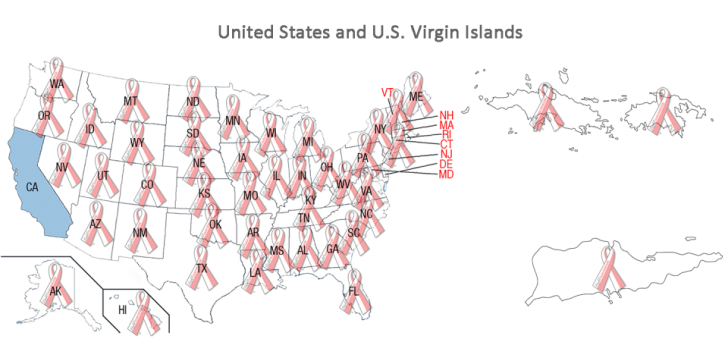CERRITOS, Calif. (February 1, 2016) – February has officially been declared “Gum Disease Awareness Month” in an effort to increase visibility to this pervasive, but often ignored, chronic disease.
Gum disease, also known as periodontal disease, is the most common infection in the United States— more widespread than cancer, heart disease and diabetes. Gum disease has been linked to several significant health issues including heart disease, stroke, diabetes, pre-term births and rheumatoid arthritis.
All U.S. states, except California, have signed proclamations over the last four years to declare February as Gum Disease Awareness Month. The sheer number of Americans with the disease, coupled with the significant health implications of untreated gum disease, underscores the importance of awareness. This national campaign is aimed at helping people make lifelong improvements to their health and quality of life by spreading awareness of the risk factors, symptoms and treatment options available in the fight against gum disease.
Fifty million Americans have moderate to severe gum disease. Of this staggering number, 40 million don’t even know they have it. And only 3 percent of those who do know they have gum disease seek treatment. Gum disease is easily prevented, yet when left untreated, it can lead to devastating effects well beyond tooth loss.

To date, forty-nine states plus the U.S. Virgin Islands have officially acknowledged Gum Disease Awareness Month to educate citizens and promote prevention and treatment:
- Alabama
- Alaska
- Arizona
- Arkansas
- Colorado
- Connecticut
- Delaware
- Florida
- Georgia
- Hawaii
- Idaho
- Illinois Indiana
- Iowa
- Kansas
- Kentucky
- Louisiana
- Maine
- Maryland
- Massachusetts
- Michigan
- Minnesota
- Mississippi
- Missouri
- Montana Nebraska
- Nevada
- New Hampshire
- New Jersey
- New Mexico
- New York
- North Carolina
- North Dakota
- Ohio
- Oklahoma
- Oregon
- Pennsylvania
- Rhode Island
- South Carolina
- South Dakota
- Tennessee
- Texas
- Utah
- Vermont
- Virginia
- Washington
- West Virginia
- Wisconsin
- Wyoming
- U.S. Virgin Islands
The initiative is supported by the Institute for Advanced Laser Dentistry (IALD), a non-profit educational and research entity dedicated to providing outcome-based clinical training for the patented LANAP® protocol a patient-friendly surgical treatment for moderate to advanced periodontal disease, and the LAPIP™ protocol for the treatment of peri-implantitis around ailing and failing dental implants.
To learn more about gum disease and treatment options, visit www.fightgumdisease.com or join the movement at www.facebook.com/fightgumdisease and www.twitter.com/fightgumdisease.
ABOUT THE INSTITUTE FOR ADVANCED LASER DENTISTRY (IALD): The Institute for Advanced Laser Dentistry, led by CEO and Training Director, Dawn M. Gregg, DDS, is a non-profit educational and research center dedicated to providing evidence-based clinical training in advanced laser dentistry therapies. Formed in 1999 by dentists Robert H. Gregg, II, DDS and Delwin K. McCarthy, DDS, the IALD is both ADA CERP and AGD PACE accredited, and is nationally recognized for its continuing education (CE) programs. With more than 35 certified instructors who train dental professionals in laser dentistry techniques including the LANAP® protocol, the IALD aims to reach more underserved patients with gum disease who have avoided therapy out of fear. To that end, the organization provides free treatment to qualified patients who can benefit from the no-cut, no-sew, no-fear LANAP® protocol—providing about $750,000 in free dental services each year. The IALD’s ultimate goal is for the percentage of patients seeking treatment for periodontitis to reach the percentage of patients seeking general dental care. For more information, please visit theiald.com.
